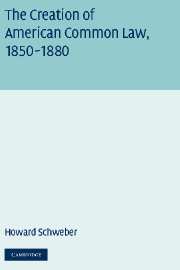 The Creation of American Common Law, 1850–1880
The Creation of American Common Law, 1850–1880 Book contents
- Frontmatter
- Contents
- Acknowledgments
- Introduction
- 1 North and South
- 2 Illinois: “We Were Determined to Have a Rail-Road”
- 3 “The Memory of Man Runneth Not to the Contrary”: Cases Involving Damage to Property
- 4 “Intelligent Beings”: Cases Involving Injuries to Persons
- 5 The North: Ohio, Vermont, and New York
- 6 Virginia through the 1850s: The Last Days of Planter Rule
- 7 The Common Law of Antebellum Virginia: The Preservation of Status
- 8 Virginia's Version of American Common Law: Old Wine in New Bottles
- 9 The South: Georgia, North Carolina, and Kentucky
- 10 Legal Change and Social Order
- Index of Cases
- Bibliography
- Index
7 - The Common Law of Antebellum Virginia: The Preservation of Status
Published online by Cambridge University Press: 22 July 2009
- Frontmatter
- Contents
- Acknowledgments
- Introduction
- 1 North and South
- 2 Illinois: “We Were Determined to Have a Rail-Road”
- 3 “The Memory of Man Runneth Not to the Contrary”: Cases Involving Damage to Property
- 4 “Intelligent Beings”: Cases Involving Injuries to Persons
- 5 The North: Ohio, Vermont, and New York
- 6 Virginia through the 1850s: The Last Days of Planter Rule
- 7 The Common Law of Antebellum Virginia: The Preservation of Status
- 8 Virginia's Version of American Common Law: Old Wine in New Bottles
- 9 The South: Georgia, North Carolina, and Kentucky
- 10 Legal Change and Social Order
- Index of Cases
- Bibliography
- Index
Summary
In reviewing the appellate cases from Virginia in the 1850s, the picture that emerges is one of great intellectual efforts invested in the project of stasis. Where Illinois moved boldly to articulate a new, American system, Virginia's high court dug in its heels and became, if anything, more traditionally English than the English themselves. This was not because Virginians were unaware of developments elsewhere. To the contrary, the highly advanced state of Virginia legal education gave the state the potential to be a center for modernization. Furthermore, in the cases before the high court, lawyers repeatedly attempted to introduce new modes of analysis, but the judges would have none of it. Where Illinois was a story of judges crafting and imposing a new system on the legal community, Virginia was a story of judges preventing the legal community from adjusting the regime of rights and duties to accord with modern requirements. And where Illinois was a story of railroad cases providing the setting for working out and defining new legal doctrines, Virginia was a story in which the handling of controversies involving railroads provided the clearest articulations of judicial resistance to change. The antebellum Virginia Supreme Court chose the traditional path of analysis on each of the crucial points around which the Illinois court had constructed its new model.
- Type
- Chapter
- Information
- The Creation of American Common Law, 1850–1880Technology, Politics, and the Construction of Citizenship, pp. 168 - 193Publisher: Cambridge University PressPrint publication year: 2004


